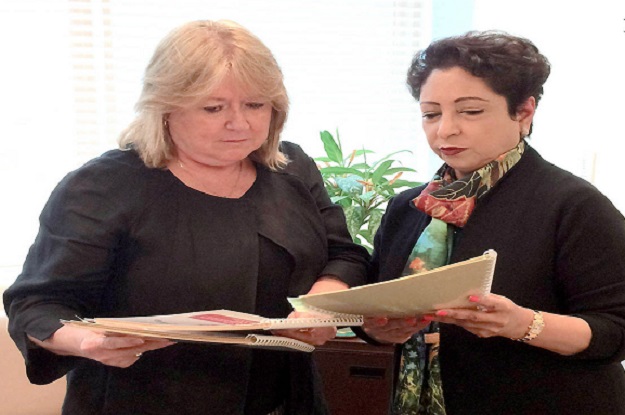
The dossiers were formally handed over to Ban Ki-moon in New York by Pakistan’s Permanent Representative to the UN Maleeha Lodhi, Prime Minister’s Adviser on National Security and Foreign Affairs Sartaj Aziz confirmed in a statement issued by the foreign ministry on Friday.
The dossiers include details of Indian interference and support for terrorism in Balochistan and Karachi, as well as its security and intelligence agencies’ link with the Tehreek-e-Taliban Pakistan (TTP), revealed Counsellor of the Permanent Mission of Pakistan to the UN Bilal Ahmad.
Pakistan was to present these dossiers to India during the cancelled national security advisers’ meeting scheduled to take place in New Delhi in August. The meeting was called off at the last minute due to differences over the agenda of the talks and Pakistan’s insistence that Aziz be allowed to meet Hurriyat leaders.
A senior Foreign Office official told The Express Tribune that Pakistan wanted to hand over dossiers to India but had to deliver the same to UN in the wake of New Delhi’s reluctance to hold talks.
The move is likely to further deteriorate already tense relations between the two nuclear-armed neighbours.
Pakistan not only presented dossiers against India but gave a stinging reply to New Delhi’s response to Prime Minister Nawaz Sharif’s speech at the UN General Assembly.
India’s External Affairs Minister Sushma Swaraj on Thursday rejected Nawaz’s four-point peace proposal and accused Pakistan of sponsoring terrorism, saying talks and terror could not go hand in hand. A spokesperson of the Indian external affairs ministry also criticised Nawaz’s speech, alleging that Pakistan was the prime sponsor, not the victim, of terrorism.
This prompted Pakistan to issue a point by point rebuttal before the UN.
Bilal Ahmed hit back at India on Friday, saying New Delhi’s insistence to limit talks to a one-point agenda proved that it was neither interested nor serious about engaging in genuine dialogue.
“Using the terrorism bogey, India has not only stalled bilateral dialogue but also vitiated the overall atmosphere between the two countries,” he said.
Rejecting allegations of sponsoring terrorism, Bilal said Pakistan’s commitment, and its role and sacrifice in the fight against terrorism, including the success of its ongoing counter-terrorism operations, had been acknowledged and praised by the entire international community.
“The entire world is also united in unequivocally condemning terrorism, except India,” he regretted.
“This country (India) is insensitive to the tragic human dimension of terrorism. India seems to suggest that acts of terrorism in Pakistan are acceptable. By doing so, India in fact seeks to mask its own support and sponsorship of terrorism in Pakistan,” the diplomat said.
Bilal said India had also failed to bring to justice the perpetrators of terrorism against innocent civilians in the 2007 Samjhota Express bombings.
“The decision of the Indian government to not challenge the bail granted to Swami Aseemanand, the main accused in the case, raises serious doubts about New Delhi’s willingness to convict its nationals involved in terror incidents against the Muslims,” he said. “This is a continuation of the sad saga of the massacre of Muslims in Gujarat.”
Dismissing India’s claims on Jammu and Kashmir, the Pakistani diplomat said New Delhi’s attempts to deny its illegal occupation of the region are a travesty of history.
“To perpetuate its occupation, India has deployed over 700,000 security forces in Indian-occupied Jammu and Kashmir. Only the occupier would oppose the implementation of UN Security Council resolutions that promised self-determination to the people of the disputed state of Jammu and Kashmir,” he said.
“If India had respect for international law and moral courage, it would end its reign of terror, withdraw its troops and let the Kashmiris freely decide their future in the UN mandated plebiscite as promised to them by the UNSC resolutions,” the Pakistani diplomat said.
Referring to several Security Council resolutions, he said “the final disposition of the state of Jammu and Kashmir would be made in accordance with the will of the people expressed through the democratic method of a free and impartial plebiscite conducted under the auspices of the UN.”
“The people of Jammu and Kashmir await fulfillment of that promise,” he added.
Published in The Express Tribune, October 3rd, 2015.













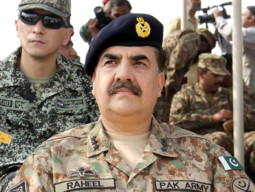
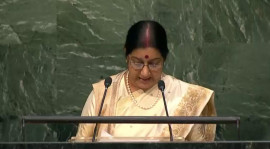
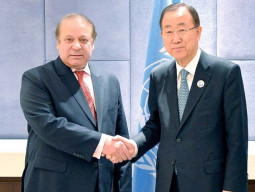

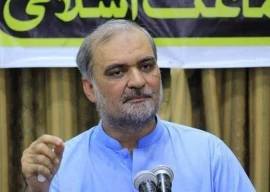

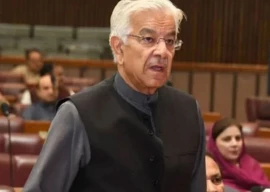
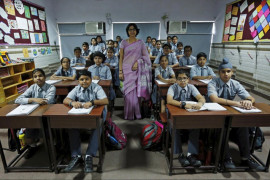
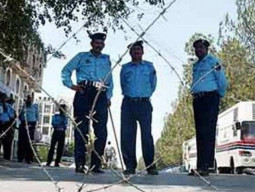










1714024018-0/ModiLara-(1)1714024018-0-270x192.webp)










COMMENTS
Comments are moderated and generally will be posted if they are on-topic and not abusive.
For more information, please see our Comments FAQ